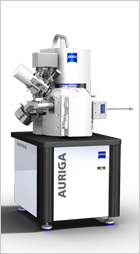At this year's AAPG show, Carl Zeiss and Ingrain Inc. announced a further strengthening of their collaboration. With the purchase of an additional AURIGA CrossBeam FIB-SEM workstation, Ingrain has broadly increased its capacity for analysis of shale rock properties at the pore scale.
"We're excited, the demand for these services has increased to the point that we needed to bring on an additional workstation," said Boaz Nur, Ingrain's VP of Operations. "It demonstrates both an increase in industry activity in shale and further adoption of our services in the market. This tool will not only serve to add capacity to our North American clients but allows us to handle the demand brought on by the global shale boom."

Ingrain's digital rock physics lab provides special core analysis services (SCAL) on oil and gas reservoir rocks using 3D imaging and computing. Using whole core, core plugs, sidewall cores or even drill cuttings, Ingrain can deliver crucial information much faster than physical labs, and at a lower overall cost.
The AURIGA CrossBeam workstation integrates a focused ion beam (FIB) system and a scanning electron microscope (SEM) in one instrument. The FIB system acts like a Nanoscale scalpel to remove very thin slices of material from a sample-like shale rock-while the SEM provides high resolution images of the rock's structure, revealing and distinguishing between voids and minerals. The AURIGA FIB/SEM fully automates these functions to produce consecutive image slices as thin as 5 nm, which can be reconstructed to form a 3-D image of the rock.
Dan McGee, President of Carl Zeiss NTS LLC in the US comments: "The deployment of our AURIGA CrossBeam FIB-SEM systems for this application is extremely exciting. Having received a further order from Ingrain strongly confirms the extraordinary high value-proposition this tool has for Ingrain."